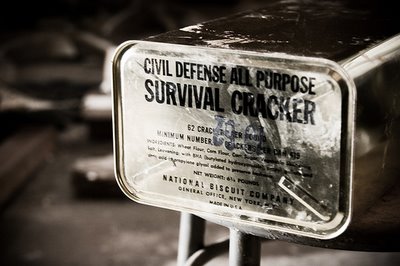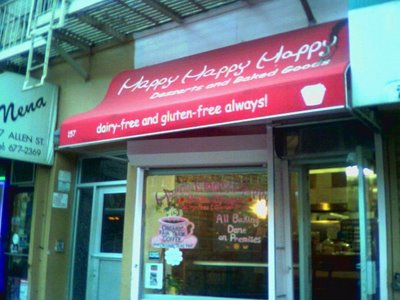 SURVIVAL CRACKERS AND YOU
SURVIVAL CRACKERS AND YOUDid you hear about
that bomb shelter recently rediscovered inside the Brooklyn Bridge? It contained more than 350,000 Survival Crackers to sustain people after a major catastrophe.
More than 350,000 Survival Crackers! I wonder how much good they'd be for survivors with celiac disease or wheat allergies. If you look very,
very closely at the above picture, you'll see that the first ingredient listed is Wheat Flour.
I bring this up because ever since the 9/11 attacks I've been concerned about food supplies provided to crisis survivors. Most people can eat conventional bread and crackers safely but of course some of us can't. "Special foods" can become scarce in a crisis that affects a large region such as the Gulf Coast in the aftermath of Hurricane Katrina.
The
American Celiac Disease Alliance (formerly the American Celiac Task Force) has put this issue on its front burner. Another one of its goals is assisting the FDA in determining a standard for determining which foods qualify as gluten-free. Still another goal is getting insurance companies to recognize consultations with dietitians as being reimbursable for celiacs.
What else do you think the ACDA should tackle? I can think of four items off the top of my head: creating a national standard for providing medically safe foods to hospital and nursing home patients and other people who receive their food through "institutions," getting the IRS to establish standard deductions for gluten-free food expenses, creating a free database of gluten-free medications, and creating a free database of gluten-free products. I don't think that the groups that have been making those product lists should be simply put out of business; perhaps they can be incorporated to work on such a project.
You can email your ideas to the ACDA via info@americanceliac.org.
Here's the group's press release:
AMERICAN CELIAC DISEASE ALLIANCE:
UNIFIED VOICE FOR CELIAC DISEASE
What started as a grassroots campaign urging Congress to require labeling of food allergens has become a broad based advocacy organization, American Celiac Disease Alliance, aimed at providing a uniform voice on behalf of persons with Celiac Disease.
More than two years ago, an ad hoc group of 15 leaders in the celiac community, came together to help pass the Food Allergen Labeling and Consumer Protection Act (FALCPA) in Congress. The bill became law on August 3, 2004, easing much of the guesswork in food shopping for some 11 million consumers with food allergies.
With this achievement, the Task Force realized the need for a permanent, advocacy organization, and elected to become the American Celiac Disease Alliance, Inc. (ACDA). This step formalizes the role of the Alliance as the umbrella organization representing the needs of the celiac community for the advancement of education, research, and advocacy as recommended by the NIH consensus panel on celiac disease in June 2004.
A not-for-profit organization, the mission of the ACDA is to provide a uniform voice on behalf of persons with Celiac Disease through education and advocacy initiatives.
Some of the early goals of the organization that are being considered include assisting the FDA in determining a gluten-free standard for foods manufactured or imported into in the United States. The FDA is required to create such a standard by August 2008.
Disaster preparedness and improving insurance reimbursement for dietitians who provide nutritional counseling to persons diagnosed with Celiac Disease are also on the top of the Alliance's project list.
Dietitians are a critical resource for newly diagnosed celiac patients and consultations with them are currently not reimbursed under many insurance plans. The group will be working with major health insurance providers to have dieticians paid for the services they provide to celiac patients.
ACDA is contacting key disaster preparedness groups such as the Red Cross and FEMA to help them develop protocol for meeting gluten-free diet needs during natural disasters. The group is also preparing a checklist of items that individuals should stock in case of emergency.
The ACDA is a volunteer organization headed by Executive Director, Andrea Levario, JD. The founding members of the organization are listed below.
Institutional:
Celiac Disease Center at Columbia UniversityNew York, NY
www.celiacdiseasecenter.columbia.edu
University of Chicago Celiac Disease Program Chicago, IL
www.celiacdisease.net
University of Maryland Center for Celiac Research Baltimore, MD
www.celiaccenter.org
Associate Members:
American Celiac Society www.americanceliacsociety.org
Celiac Disease Foundation www.celiac.org
Gluten Intolerance Group www.gluten.net
Industry Members:
Bob & Ruth's Gluten-free Dining & Travel www.bobandruths.com
Ener-G Foods, Inc. www.energ.com
Gluten-Free Living Magazine www.glutenfreeliving.com
Glutino-USA www.glutenfree.com
Living Without www.livingwithout.com
Prometheus Laboratories Inc. www.prometheuslabs.com
Affiliate Members:
Allison Herwitt
Andrea Levario, J.D.
Joseph Murray, M.D.
Michelle Pietzak, M.D.
For Further Information Contact: Andrea Levario, Exec. Director
info@Americanceliac.org
www.americanceliac.org
Photo courtesy of Alison Grippo (alison.grippo@gmail.com)





